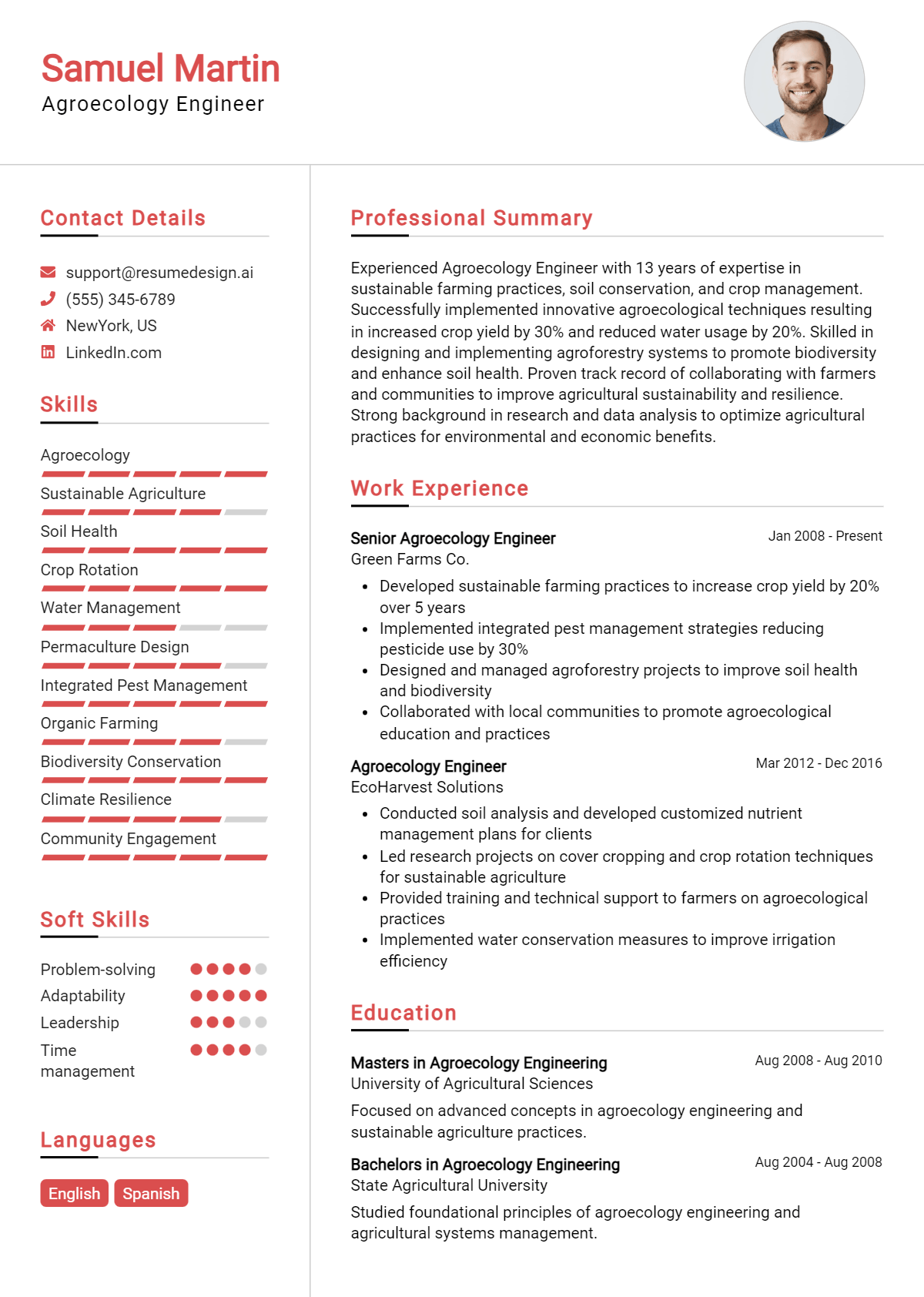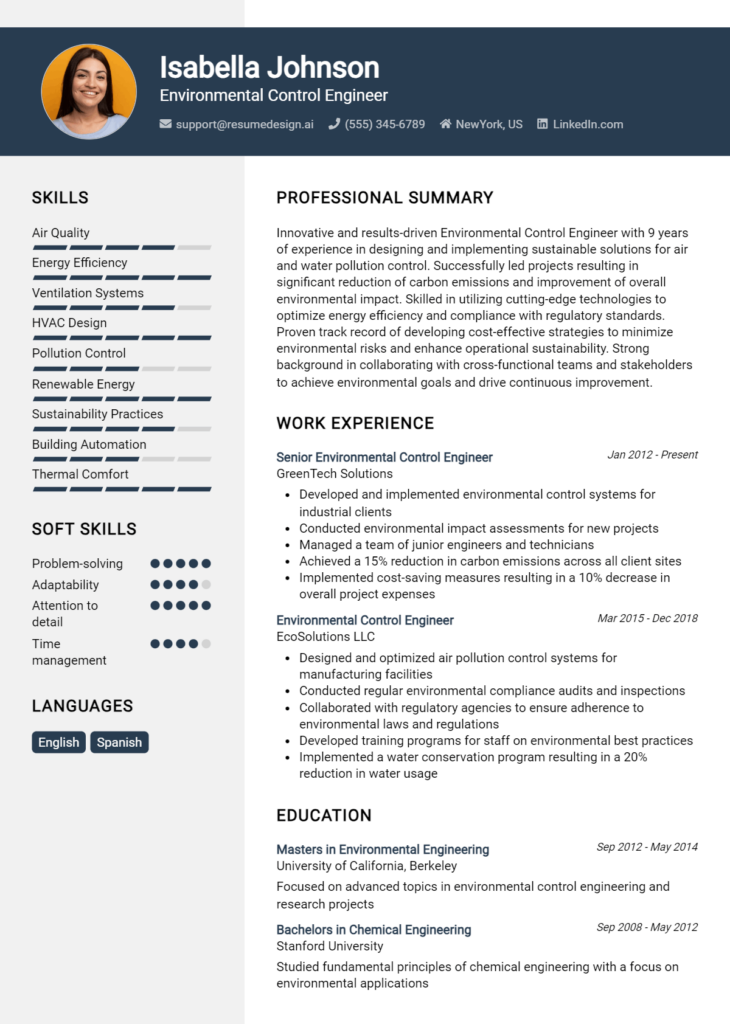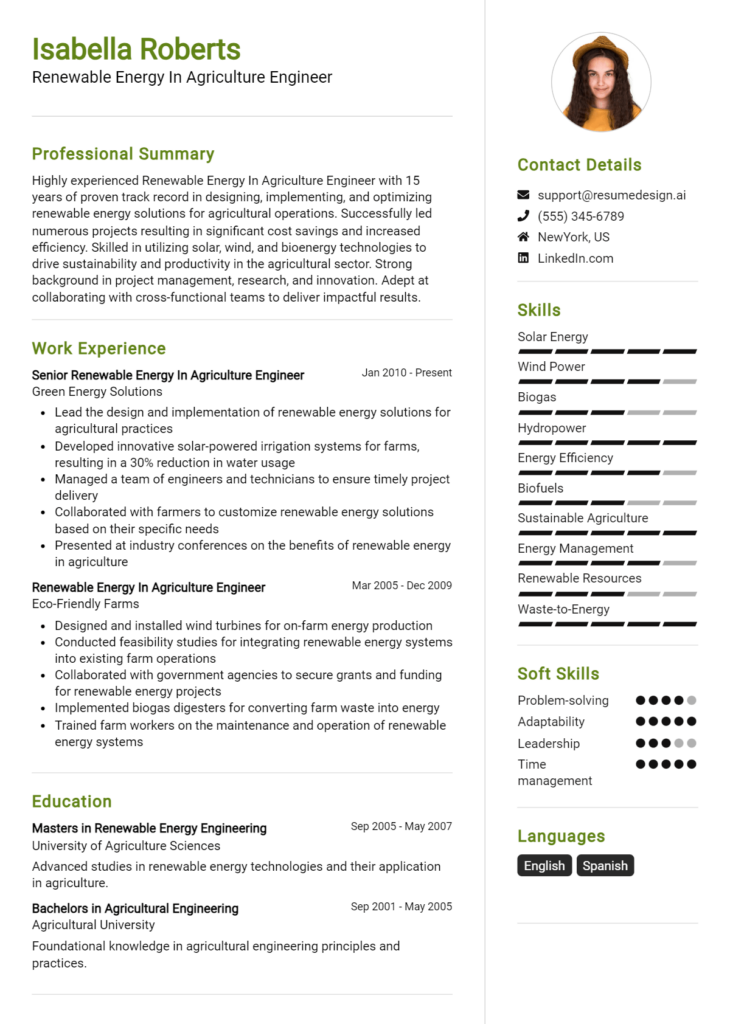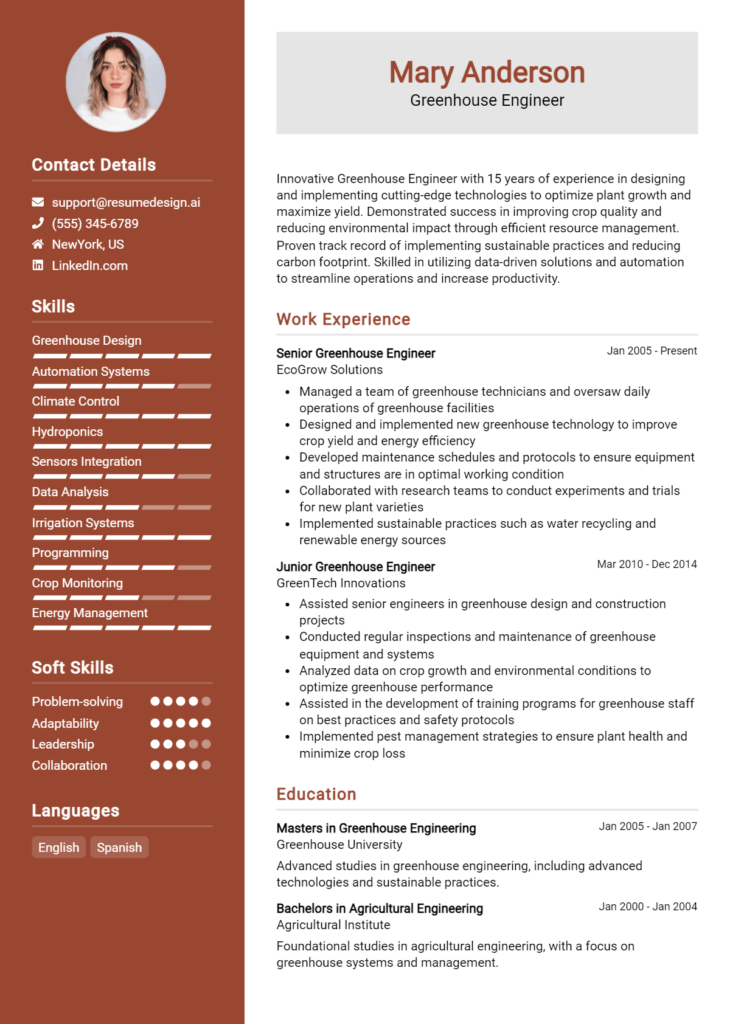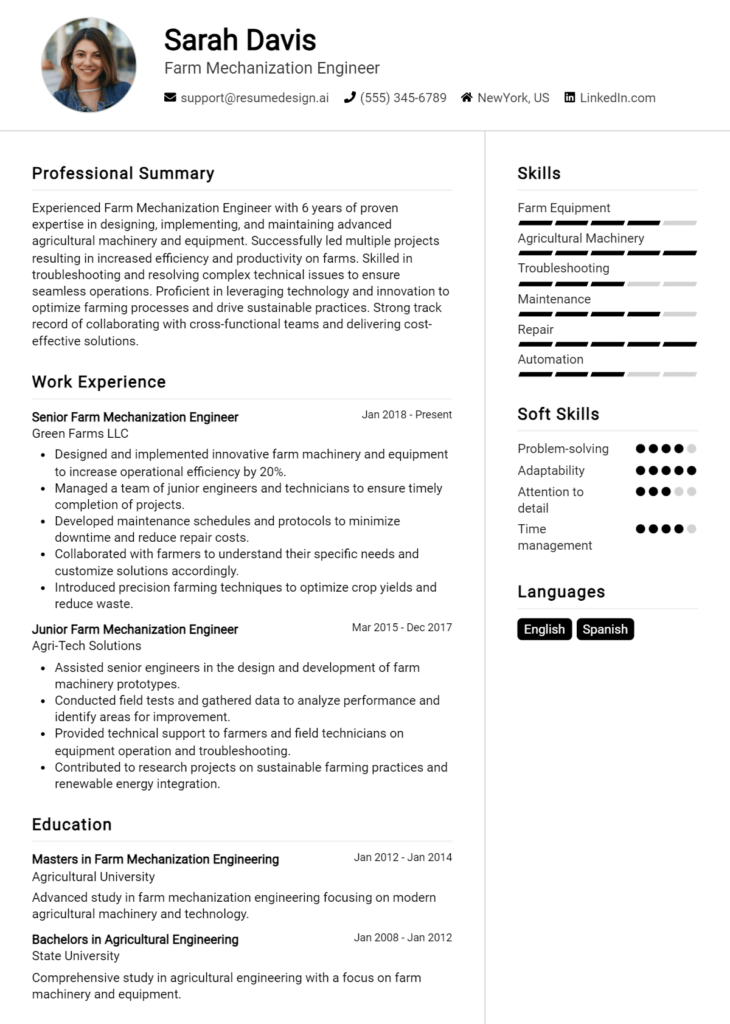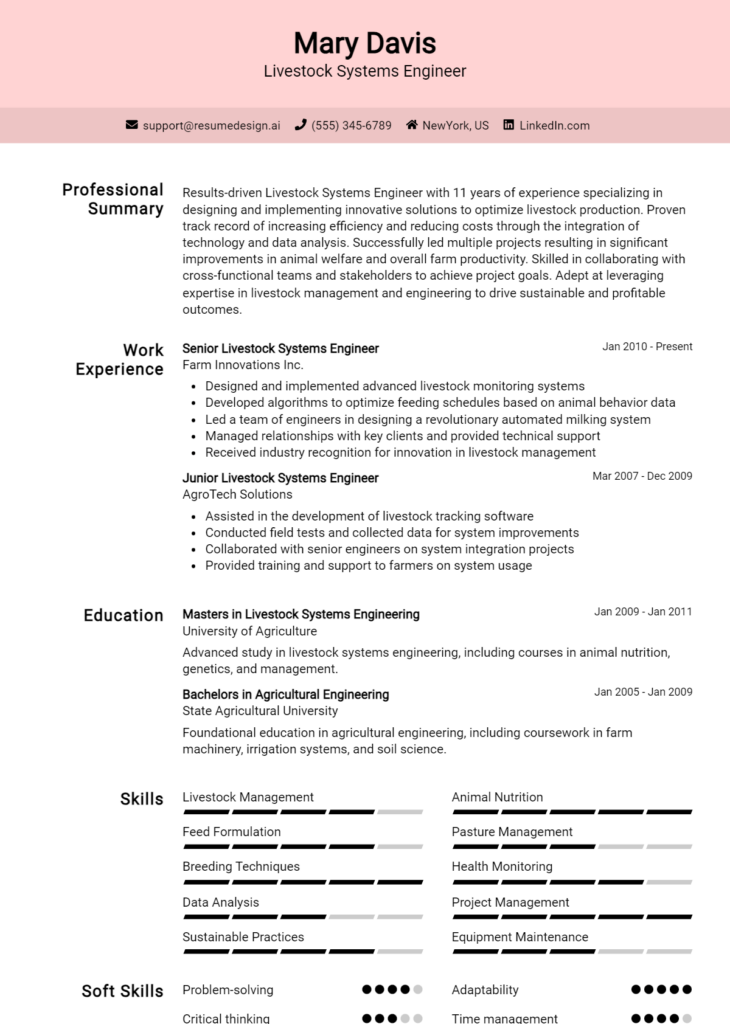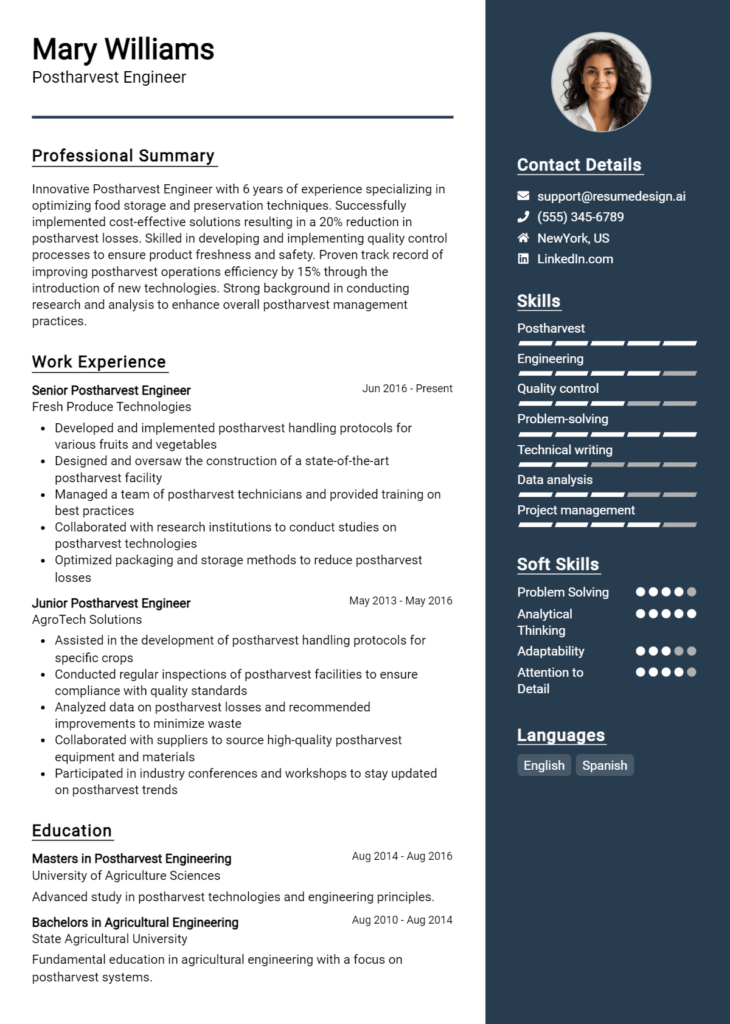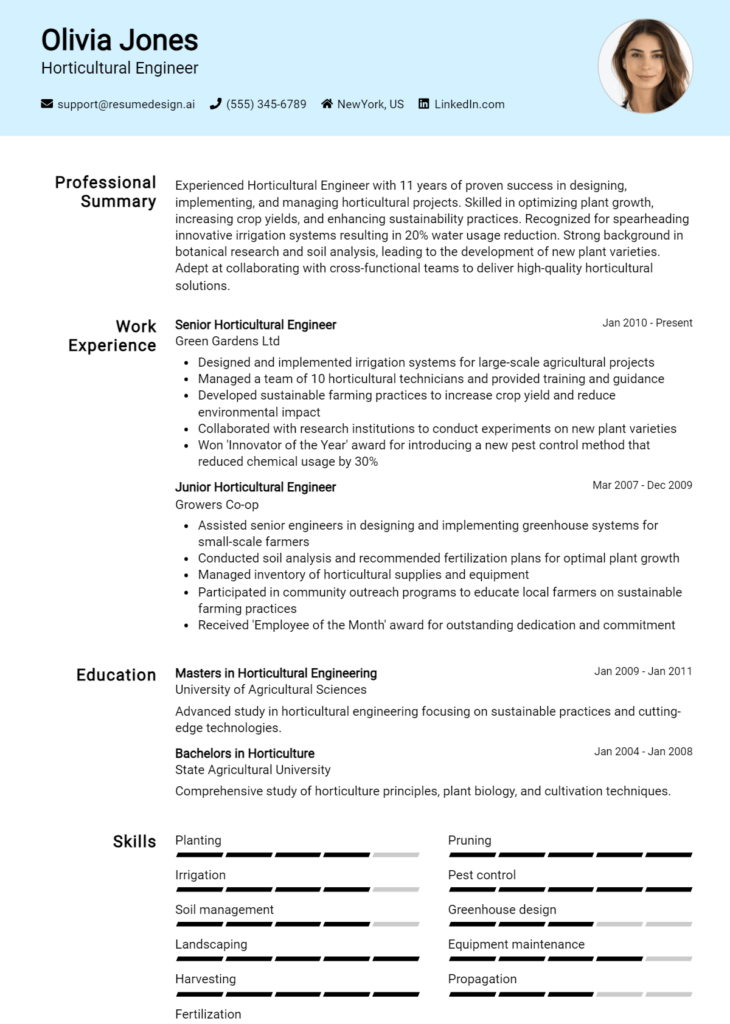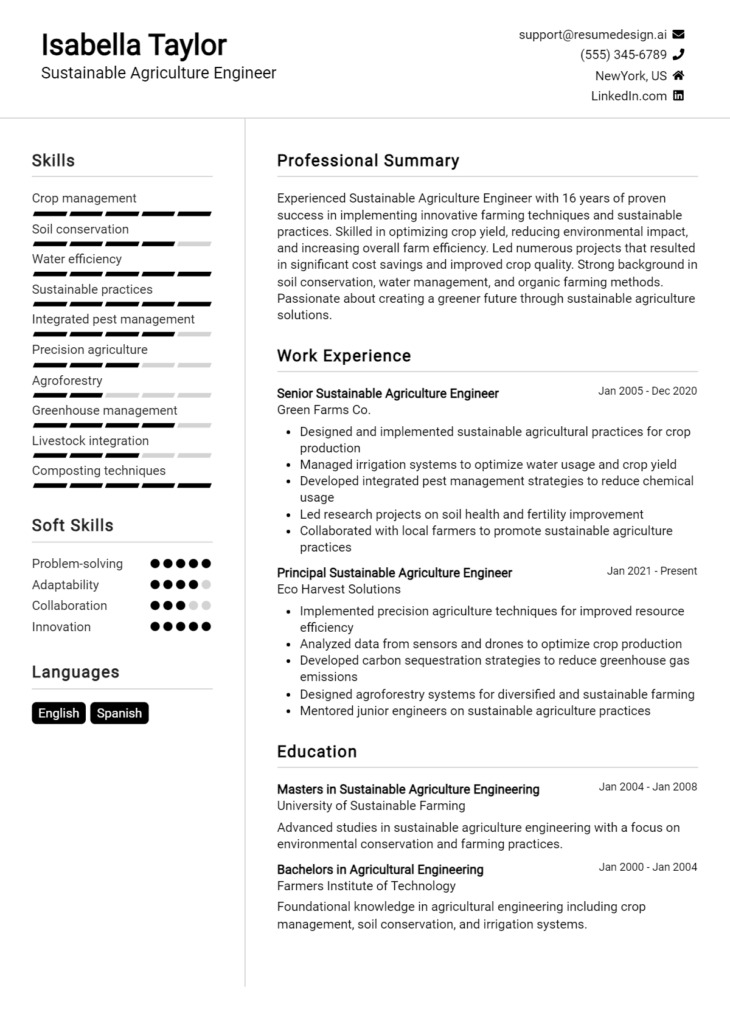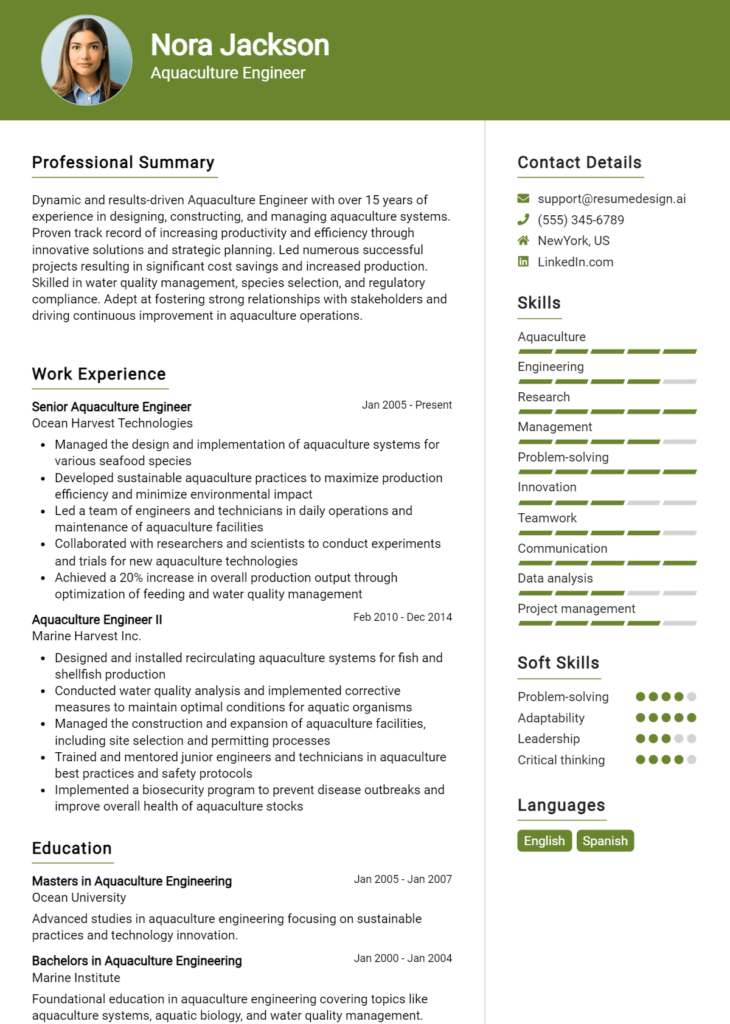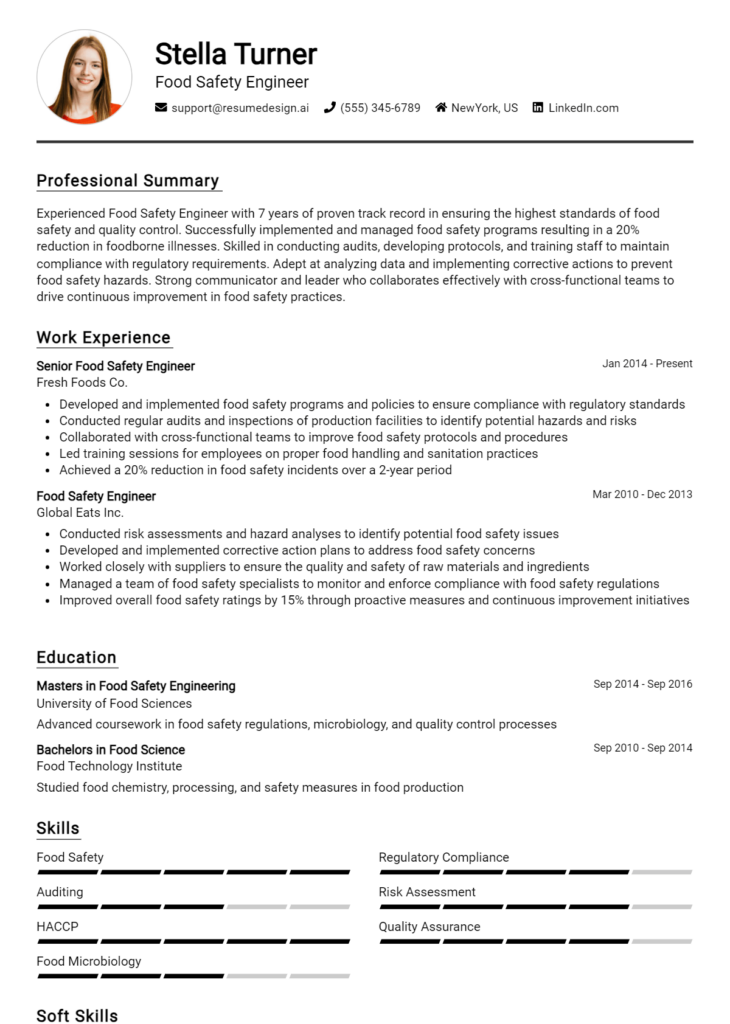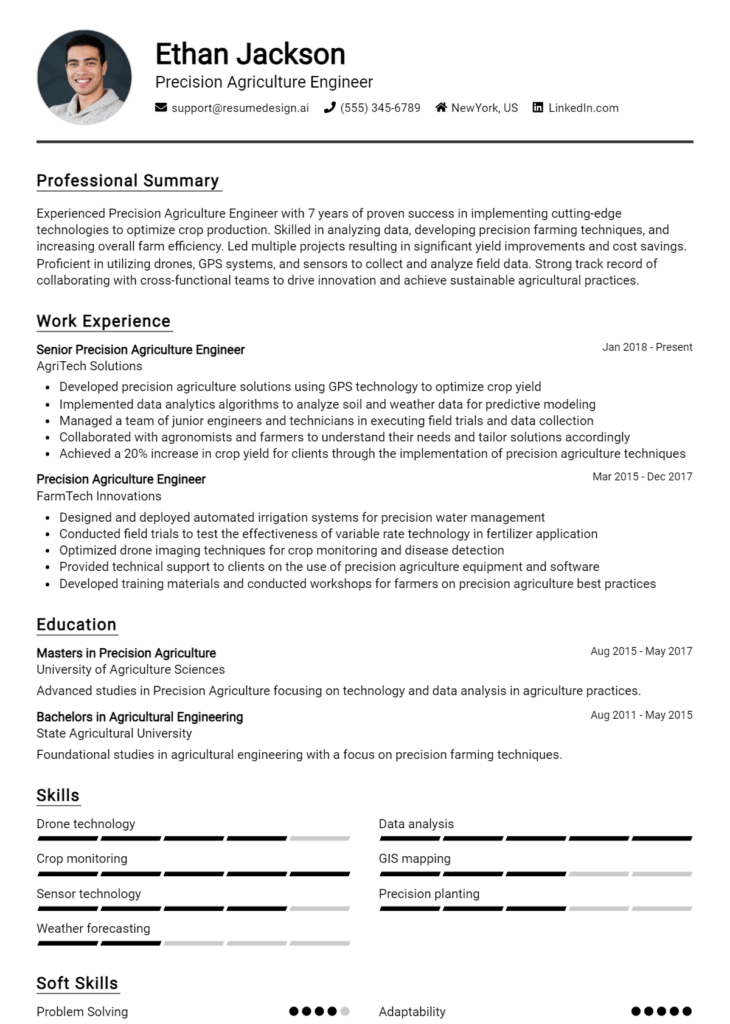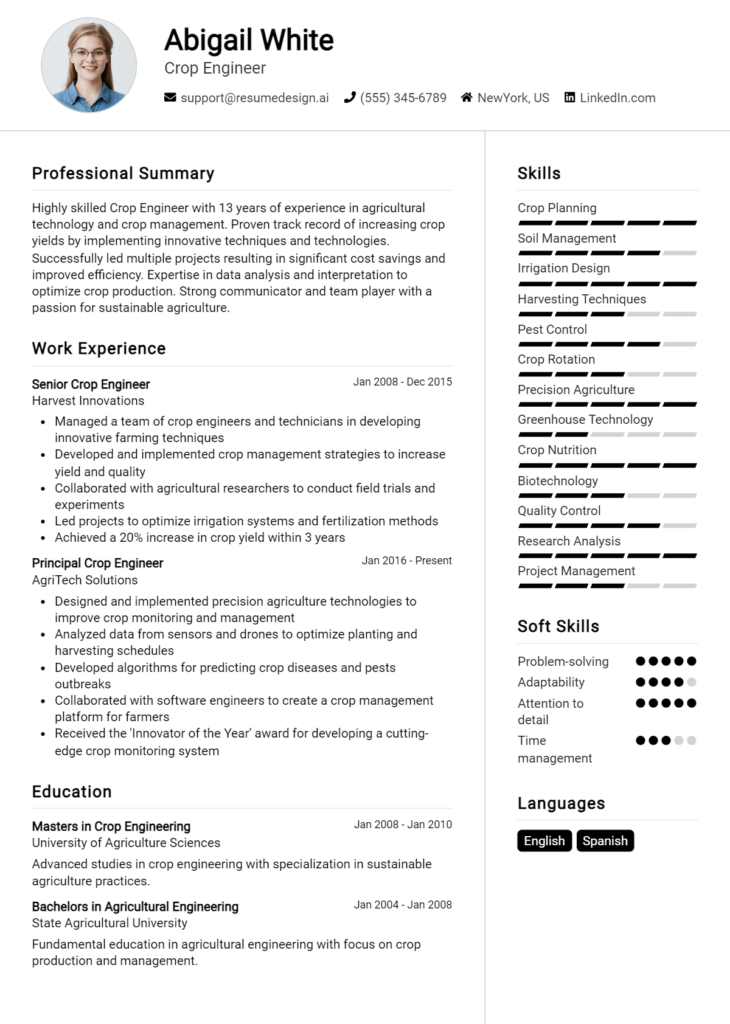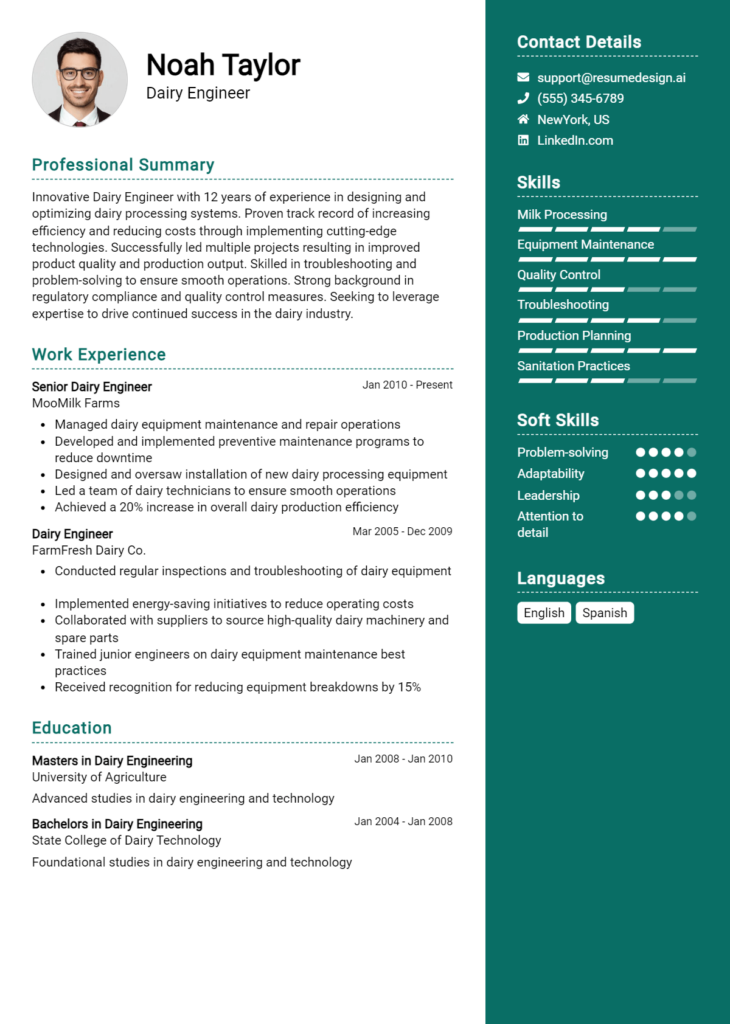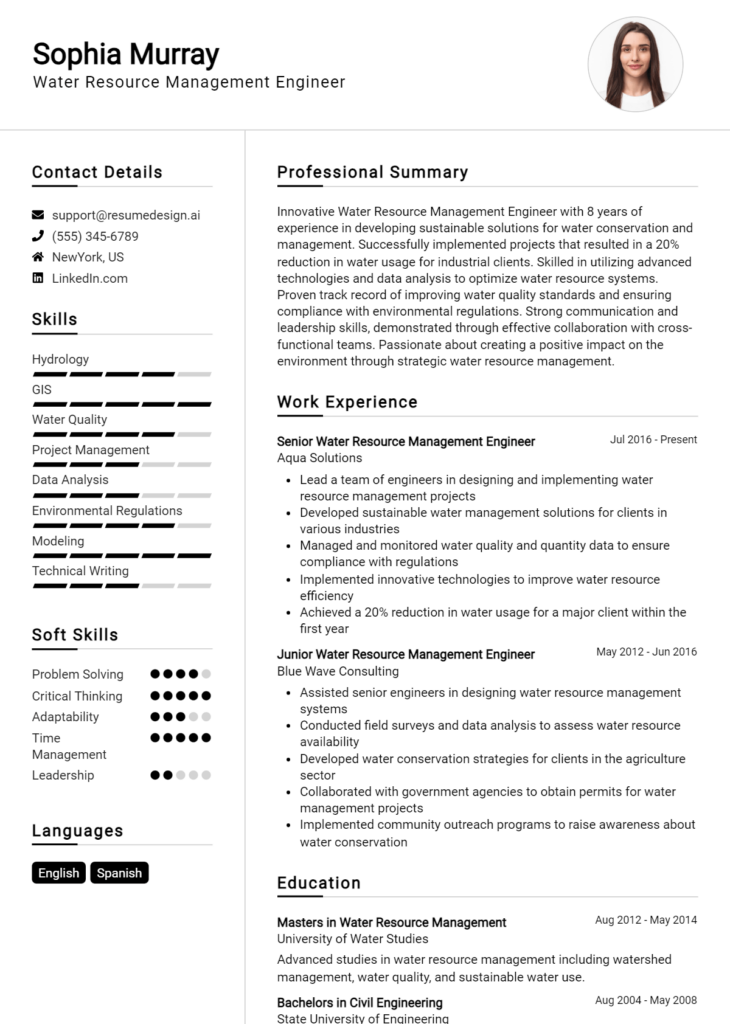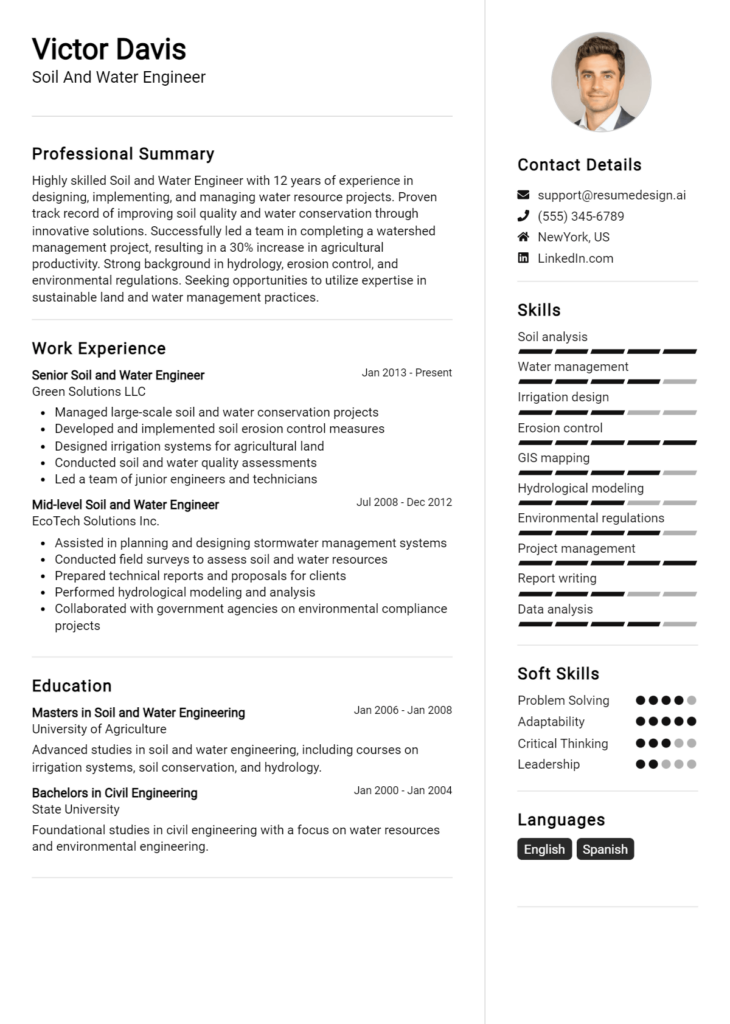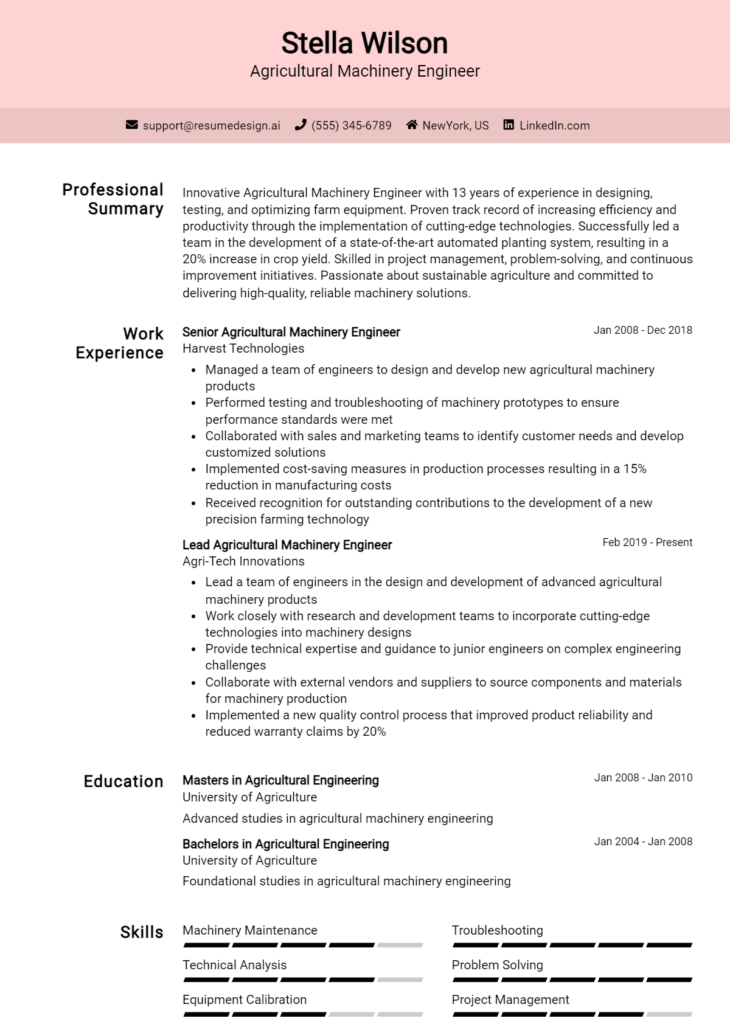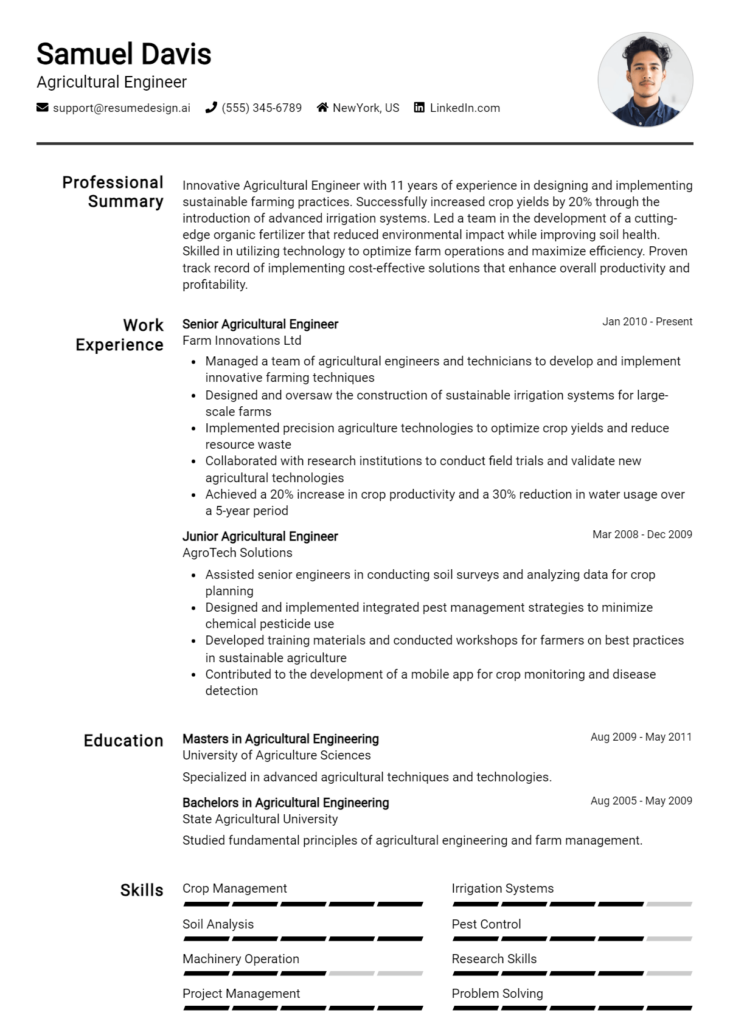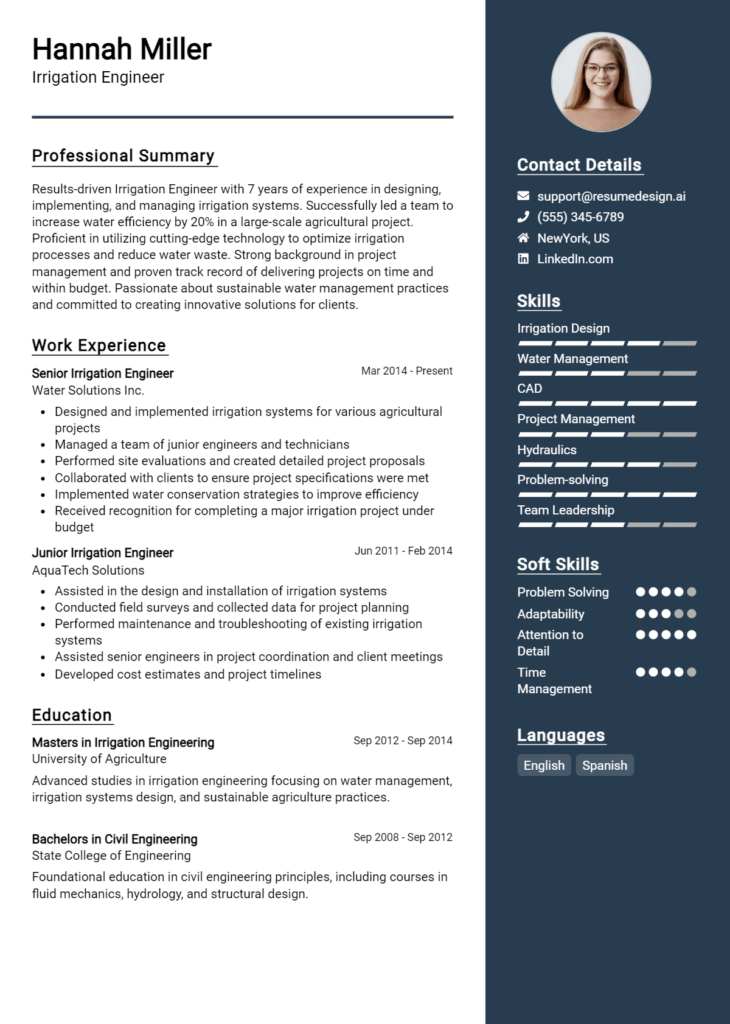Agroecology Engineer Core Responsibilities
An Agroecology Engineer plays a pivotal role in integrating ecological principles into agricultural practices, ensuring sustainable food production. Key responsibilities include designing agroecosystems, conducting research, and implementing innovative farming techniques. This position requires strong technical, operational, and problem-solving skills to effectively collaborate across departments, such as environmental science, agronomy, and policy-making. These competencies contribute to the organization’s sustainability goals, and a well-structured resume can effectively highlight these qualifications, showcasing the candidate’s impact on eco-friendly practices.
Common Responsibilities Listed on Agroecology Engineer Resume
- Design and implement sustainable agricultural systems.
- Conduct field research to evaluate agroecological practices.
- Analyze soil health and crop performance data.
- Collaborate with multidisciplinary teams on ecological projects.
- Develop strategies for pest and nutrient management.
- Educate farmers on sustainable farming techniques.
- Monitor and assess the environmental impact of agricultural practices.
- Prepare reports and presentations on research findings.
- Advise on policy development for sustainable agriculture.
- Implement agroecological principles in land management.
- Utilize GIS technology for land-use planning and analysis.
- Engage with stakeholders to promote agroecological initiatives.
High-Level Resume Tips for Agroecology Engineer Professionals
In today's competitive job market, a well-crafted resume is crucial for Agroecology Engineer professionals aiming to stand out to potential employers. Your resume often serves as the first impression, making it essential that it effectively showcases your unique skills and accomplishments in the field. A resume tailored specifically for Agroecology Engineering not only highlights your technical abilities but also reflects your commitment to sustainable agricultural practices and innovative solutions. In this guide, we will provide practical and actionable resume tips designed to help Agroecology Engineer professionals present themselves in the best light possible.
Top Resume Tips for Agroecology Engineer Professionals
- Tailor your resume to the specific job description by incorporating relevant keywords and phrases that align with the position.
- Highlight your relevant experience in agroecology projects, internships, or research, emphasizing your role and contributions.
- Quantify your achievements by using metrics, such as the percentage of yield increase achieved through sustainable practices.
- Showcase industry-specific skills, such as knowledge of soil health management, crop rotation strategies, and agroecosystem design.
- Include certifications or training relevant to agroecology, such as permaculture design or organic farming practices.
- Utilize a clean and professional format that enhances readability and allows your key accomplishments to stand out.
- Incorporate a summary statement that succinctly captures your professional background and passion for agroecology.
- List professional affiliations or memberships in organizations related to agroecology, demonstrating your engagement with the field.
- Keep your resume concise, ideally one page, focusing on the most relevant information that supports your candidacy.
By implementing these tips, Agroecology Engineer professionals can significantly enhance their resumes, making them more appealing to potential employers. A well-structured and targeted resume not only showcases your qualifications but also increases your chances of landing a job in the dynamic field of agroecology, where innovative solutions are in high demand.
Why Resume Headlines & Titles are Important for Agroecology Engineer
In the competitive field of agroecology, a well-crafted resume headline or title can significantly influence a hiring manager’s first impression. This brief yet powerful statement serves as a hook that captures attention and succinctly summarizes a candidate's key qualifications and expertise. With the right headline, an applicant can effectively communicate their specialization in sustainable agricultural practices, research skills, or project management abilities, thereby making it easier for recruiters to quickly assess their fit for the role. A strong headline should be concise, relevant, and directly aligned with the specific position being applied for, ensuring that it resonates with the employer's needs.
Best Practices for Crafting Resume Headlines for Agroecology Engineer
- Keep it concise—aim for one to two impactful phrases.
- Make it role-specific by including relevant keywords from the job description.
- Highlight your unique strengths, such as specialized skills or notable accomplishments.
- Use active language to convey confidence and expertise.
- Avoid jargon that may not be universally understood; clarity is key.
- Incorporate measurable results where possible to demonstrate impact.
- Tailor your headline for each job application to increase relevance.
- Ensure it aligns with the overall tone and content of your resume.
Example Resume Headlines for Agroecology Engineer
Strong Resume Headlines
Innovative Agroecology Engineer Specializing in Sustainable Farming Solutions
Results-Driven Professional with 5+ Years in Agroecological Research and Development
Expert in Soil Health and Crop Diversity for Enhanced Agricultural Productivity
Dynamic Agroecologist with Proven Success in Community-Based Agricultural Projects
Weak Resume Headlines
Seeking a Job in Agriculture
Experienced Worker
Professional in Environmental Science
The strong headlines are effective because they are specific, descriptive, and focus on tangible skills or experiences that are directly relevant to the agroecology field. They inform the employer about the candidate's unique qualifications at a glance, making it easier for the hiring manager to see the value the candidate can bring to their organization. In contrast, the weak headlines fail to impress as they are vague, overly generic, and do not provide any insight into the candidate's capabilities or areas of expertise, making it difficult for employers to gauge their suitability for the role.
Writing an Exceptional Agroecology Engineer Resume Summary
A resume summary is a critical component for an Agroecology Engineer as it serves as the first impression for hiring managers. A well-crafted summary succinctly highlights key skills, relevant experience, and notable accomplishments, immediately capturing the attention of prospective employers. In a competitive job market, where attention spans are short, a strong summary must be concise and impactful, tailored specifically to the job the candidate is applying for. This not only demonstrates the applicant's qualifications but also their genuine interest in the role, setting the stage for a favorable evaluation by hiring professionals.
Best Practices for Writing a Agroecology Engineer Resume Summary
- Quantify Achievements: Use numbers and metrics to demonstrate the impact of your work.
- Focus on Relevant Skills: Highlight skills that are directly applicable to the Agroecology Engineer position.
- Tailor the Summary: Customize the summary to align with the specific job description.
- Use Strong Action Verbs: Begin sentences with dynamic verbs to convey confidence and expertise.
- Keep it Concise: Aim for 3-5 sentences that effectively communicate your value.
- Highlight Unique Experiences: Mention any specialized training or unique projects that set you apart.
- Showcase Soft Skills: Include interpersonal skills that are valuable in team settings and project management.
- Proofread for Clarity: Ensure the summary is free from errors and clearly written for maximum impact.
Example Agroecology Engineer Resume Summaries
Strong Resume Summaries
Results-driven Agroecology Engineer with over 5 years of experience in sustainable farming practices, leading projects that increased crop yields by 30% while reducing chemical usage by 20%. Proficient in soil health assessment and biodiversity management, with a Master's degree in Agroecology.
Dedicated Agroecology Engineer skilled in developing innovative agroecological systems with a proven track record of reducing water consumption by 40% in agricultural operations. Experienced in implementing permaculture principles, leading to a 25% increase in soil fertility across multiple projects.
Accomplished Agroecology Engineer with expertise in integrating agroforestry techniques that resulted in a 50% enhancement in local ecosystems. Recognized for collaborating with farmers to adopt sustainable practices, achieving a 15% increase in community income through eco-friendly crops.
Weak Resume Summaries
Experienced engineer with a background in agriculture looking for new opportunities. I have worked on various projects and have some relevant skills.
Skilled in agricultural practices and sustainability. I am seeking a job where I can apply my knowledge and experience in agroecology.
The strong resume summaries are considered effective because they emphasize quantifiable achievements, specific skills relevant to the Agroecology Engineer role, and provide a clear picture of the candidate's contributions to previous employers. In contrast, the weak summaries lack specificity and measurable outcomes, making them too generic and less compelling to hiring managers. By failing to detail concrete results or relevant skills, these summaries do not adequately convey the candidate's potential value to an employer.
Work Experience Section for Agroecology Engineer Resume
The work experience section of an Agroecology Engineer resume is vital in demonstrating a candidate's expertise and effectiveness in the field. This section highlights not only technical skills but also the ability to manage teams and deliver high-quality products that meet industry standards. By quantifying achievements and aligning past experiences with the needs of prospective employers, candidates can effectively showcase their value and readiness to contribute to agroecological projects. This alignment is crucial for standing out in a competitive job market.
Best Practices for Agroecology Engineer Work Experience
- Use specific metrics to quantify achievements, such as percentages, dollar amounts, or project timelines.
- Highlight leadership roles and team management experiences to showcase collaboration and interpersonal skills.
- Tailor your work experience to align with the specific requirements of the job description.
- Describe technical skills in detail, focusing on relevant tools and methodologies used in agroecology.
- Include a variety of experiences, such as internships, projects, and volunteer work, to illustrate a well-rounded background.
- Utilize action verbs to convey a sense of proactivity and impact in your roles.
- Showcase problem-solving abilities by detailing challenges faced and solutions implemented.
- Incorporate feedback or outcomes from stakeholders to reinforce the quality of your contributions.
Example Work Experiences for Agroecology Engineer
Strong Experiences
- Led a team of 5 engineers in a project that improved crop yield by 30% through the implementation of sustainable irrigation technologies.
- Developed and executed a soil health assessment program that reduced fertilizer costs by 15%, saving the company $50,000 annually.
- Collaborated with local farmers to design and implement agroecological practices, resulting in a 25% increase in biodiversity on participating farms.
- Managed a multi-disciplinary project that integrated agroforestry techniques, leading to a 40% enhancement in soil carbon sequestration over two years.
Weak Experiences
- Worked on various projects related to farming.
- Assisted in team tasks without specific contributions.
- Participated in meetings and discussions about agroecology.
- Helped with data collection for agricultural studies.
The strong experiences listed highlight quantifiable outcomes and demonstrate clear leadership, collaboration, and technical expertise relevant to the role of an Agroecology Engineer. In contrast, the weak experiences lack specific achievements or measurable impacts, making them less compelling to potential employers. By focusing on concrete results and responsibilities, candidates can significantly enhance the effectiveness of their work experience section.
Education and Certifications Section for Agroecology Engineer Resume
The education and certifications section of an Agroecology Engineer resume plays a crucial role in showcasing a candidate’s academic prowess, industry-relevant qualifications, and commitment to continuous improvement in the field. By detailing relevant degrees, certifications, and specialized training, this section not only enhances the candidate's credibility but also demonstrates alignment with the specific demands of the job role. Highlighting coursework that directly pertains to agroecology principles, sustainable practices, and environmental management further underscores the candidate's preparedness to tackle the challenges faced in this dynamic field.
Best Practices for Agroecology Engineer Education and Certifications
- Include degrees from accredited institutions that focus on agroecology, environmental science, or related fields.
- List industry-recognized certifications, such as Certified Crop Adviser (CCA) or Sustainable Agriculture Certification.
- Provide relevant coursework that showcases specialized knowledge in agroecological practices, soil science, or pest management.
- Highlight any advanced degrees (Masters or PhD) that demonstrate a higher level of expertise.
- Note any ongoing professional development or workshops that keep skills up-to-date.
- Use clear and concise language to describe education and certifications, making it easy for hiring managers to identify qualifications.
- Prioritize the most relevant qualifications that align directly with the job description and responsibilities.
- Consider including honors or awards received during academic pursuits that reflect excellence in the field.
Example Education and Certifications for Agroecology Engineer
Strong Examples
- Master of Science in Agroecology, University of California, Davis.
- Certified Crop Adviser (CCA) – American Society of Agronomy.
- Coursework in Sustainable Agriculture Practices, Soil Health Management, and Integrated Pest Management.
- Certificate in Agroecological Farming Systems from the International Agroecology Institute.
Weak Examples
- Bachelor of Arts in History from a non-related institution.
- Certification in Basic Computer Skills (not relevant to agroecology).
- Old certification in Traditional Farming Techniques (outdated and not industry-recognized).
- Coursework in Art Appreciation and Literature.
The strong examples listed above are considered robust because they directly align with the responsibilities and expectations of an Agroecology Engineer, showcasing relevant knowledge and skills applicable to the field. In contrast, the weak examples lack relevance to agroecology and do not support the candidate's qualifications for the role, potentially leading hiring managers to question the candidate's alignment with industry requirements.
Top Skills & Keywords for Agroecology Engineer Resume
In the competitive field of agroecology engineering, having a well-structured resume that highlights relevant skills is crucial for standing out to potential employers. Skills serve as a vital link between your experience and the job requirements, showcasing your ability to contribute effectively to sustainable agriculture and environmental conservation. A well-rounded skill set not only enhances your employability but also demonstrates your commitment to promoting ecological balance and agricultural efficiency. Crafting your resume with an emphasis on both hard and soft skills can significantly improve your chances of landing your desired position in this dynamic field.
Top Hard & Soft Skills for Agroecology Engineer
Soft Skills
- Communication
- Teamwork and collaboration
- Problem-solving
- Critical thinking
- Adaptability
- Leadership
- Time management
- Conflict resolution
- Creativity
- Cultural awareness
- Empathy
- Decision-making
- Networking
- Project management
- Attention to detail
Hard Skills
- Soil science and management
- Crop rotation techniques
- Sustainable farming practices
- Ecological modeling
- Data analysis and interpretation
- Geographic Information Systems (GIS)
- Pest and weed management
- Organic certification processes
- Environmental impact assessment
- Agricultural policy knowledge
- Research methodology
- Irrigation design
- Climate change adaptation strategies
- Farm management software proficiency
- Statistical software expertise
- Remote sensing technology
- Field sampling techniques
For a deeper exploration of how to effectively showcase your skills and work experience in your resume, consider integrating these elements to create a compelling narrative that aligns with the expectations of employers in the agroecology sector.
Stand Out with a Winning Agroecology Engineer Cover Letter
Dear [Hiring Manager's Name],
I am writing to express my interest in the Agroecology Engineer position at [Company Name], as advertised on [where you found the job listing]. With a solid educational background in agricultural engineering and hands-on experience in sustainable farming practices, I am excited about the opportunity to contribute to your team. My passion for developing innovative solutions that enhance agricultural productivity while preserving environmental integrity aligns perfectly with the values and mission of your organization.
During my previous role at [Previous Company Name], I successfully designed and implemented agroecological systems that improved soil health and increased crop yields by 30% over two growing seasons. My work involved collaborating closely with local farmers to introduce crop rotation strategies, organic pest management, and water conservation techniques. This experience not only honed my technical skills but also strengthened my ability to communicate effectively with diverse stakeholders, ensuring that solutions are both scientifically sound and culturally relevant. I am particularly drawn to [Company Name] because of your commitment to community engagement and sustainable agriculture, and I am eager to bring my expertise in agroecological design to support your initiatives.
Furthermore, I have a strong foundation in data analysis and modeling, which enables me to assess and optimize agricultural systems effectively. My proficiency in using software tools such as GIS and simulation models complements my practical experience in the field. I am dedicated to continuous learning and have recently completed a certification in regenerative agriculture, which has deepened my understanding of ecosystem dynamics and their application in agroecological practices. I am confident that my unique blend of knowledge and experience will allow me to make meaningful contributions to your team and help advance [Company Name]'s projects.
Thank you for considering my application. I am looking forward to the opportunity to discuss how my background, skills, and enthusiasms align with the goals of [Company Name]. I am excited about the possibility of working together to promote sustainable agriculture and contribute to a healthier planet.
Sincerely,
[Your Name]
[Your Contact Information]
[Your LinkedIn Profile or Website, if applicable]
Common Mistakes to Avoid in a Agroecology Engineer Resume
When crafting a resume for an Agroecology Engineer position, it's crucial to present your skills and experience effectively. However, many candidates make common mistakes that can undermine their chances of landing an interview. Avoiding these pitfalls can help you stand out in a competitive job market. Here are some of the most frequent errors to watch out for:
Generic Objective Statement: Using a vague objective that doesn't reflect your specific goals or the needs of the employer can make your resume blend in with the rest. Tailor your statement to demonstrate your passion for agroecology and your fit for the position.
Lack of Relevant Keywords: Failing to incorporate industry-specific keywords can result in your resume being overlooked by Applicant Tracking Systems (ATS). Analyze the job description and include terms related to agroecology, sustainability, and environmental science.
Overloading with Jargon: While technical language is important in agroecology, using too much jargon can confuse hiring managers who may not be specialists in your field. Strive for a balance between demonstrating expertise and ensuring clarity.
Neglecting Soft Skills: Focusing solely on technical qualifications without mentioning soft skills like communication, teamwork, and problem-solving can give an incomplete picture. Highlight experiences that showcase these interpersonal skills.
Ignoring Achievements: Simply listing job responsibilities without emphasizing accomplishments fails to demonstrate your impact in previous roles. Use quantifiable metrics to illustrate your contributions, such as improved crop yields or successful project outcomes.
Inconsistent Formatting: A resume that lacks a cohesive format can distract from your qualifications. Ensure consistent font styles, sizes, and spacing throughout to present a professional appearance.
Failing to Customize for Each Application: Sending out the same resume for multiple positions can lead to missed opportunities. Tailor your resume for each job application to align your experience with the specific requirements of the role.
Excessive Length: A resume that is too long may discourage hiring managers from reading it thoroughly. Aim for one to two pages, focusing on the most relevant experiences and skills that pertain to the agroecology field.
Conclusion
As an Agroecology Engineer, your role is pivotal in promoting sustainable agricultural practices that enhance productivity while preserving environmental health. Throughout this article, we've explored the essential skills and qualifications required in this dynamic field, including knowledge of ecological principles, soil science, and sustainable farming techniques. We also discussed the importance of interdisciplinary collaboration and innovative problem-solving to address the challenges facing modern agriculture.
With the increasing demand for professionals in agroecology, ensuring that your resume effectively highlights your expertise and accomplishments is crucial. Take the time to review and refine your Agroecology Engineer resume to stand out in a competitive job market.
To assist you in this process, consider utilizing available resources such as resume templates, which can provide a professional layout for your information. Additionally, the resume builder can help you craft a tailored resume that showcases your skills effectively. Don't forget to check out resume examples for inspiration and ideas on how to present your experience. Finally, complement your resume with a strong application by using our cover letter templates to make a compelling case for your candidacy.
Now is the time to take action—review your resume and leverage these tools to enhance your job application. Your future as an Agroecology Engineer awaits!

